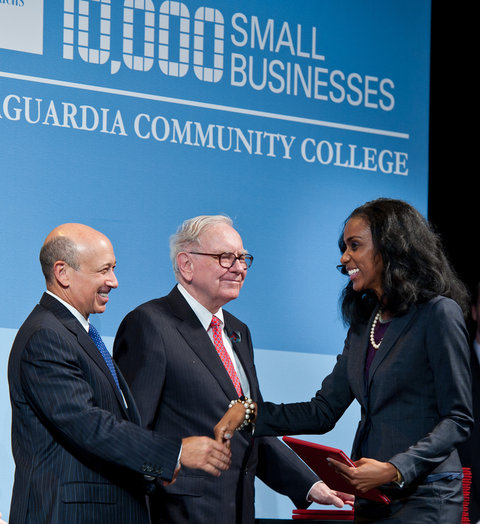 Courtesy of Goldman Sachs.Jessica Johnson, graduating from the 10,000 Small Businesses program.
Courtesy of Goldman Sachs.Jessica Johnson, graduating from the 10,000 Small Businesses program.
She Owns It
Portraits of women entrepreneurs.
A glance at my e-mail in box reveals no shortage of corporate-sponsored programs intended to help small-business owners. But do they work? And if so, how do the owners measure success?
Jessica Johnson, a member of our business group who owns Johnson Security Bureau (the company has a new Web site), graduated from 10,000 Small Businesses, a Goldman Sachs program in September 2010. Recently, she discussed her 10,000 Small Businesses experience, including what it was like day-to-day and whether it yielded results.
Ms. Johnson was in the program’s first class of 23 business owners, which began meeting in April 2010. At the time, participants met every other Saturday, from 8:30 a.m. to 6 p.m. (The meeting schedule has changed since then.) Class sessions, taught by a team that included instructors from Babson College, LaGuardia Community College and the Wharton School, were supplemented by workshops on topics like hiring and legal issues.
By the program’s conclusion, each business owner was responsible for creating a “growth plan” — defined by Ms. Johnson as a business plan that goes beyond mere maintenance. Class assignments like preparing financials or doing a supply-chain analysis built toward this plan.
As part of the program, Ms. Johnson was also placed in a “growth group” to facilitate peer-to-peer learning. Each group comprised four to six business owners who worked in complementary industries. Ms. Johnson was part of a group of five construction-related business owners. They met before each Saturday session to share leads and discuss referrals. At the time, Johnson Security had no construction-related security clients.
Ms. Johnson’s growth group included Leo Fabio, the owner of LLF Construction Services. When Ms. Johnson mentioned that she was having no luck bidding on construction projects, Mr. Fabio asked for details. The companies, Ms. Johnson explained, often complained that her quotes were too high. But the problem, she said, was that construction contracts required her to project costs well into the future. “Maybe I can project for 12 to 18 months,” she said, “but after that there are too many variables.”
Mr. Fabio, who also teaches a class on estimating for contractors, suggested Ms. Johnson might get better results by breaking out her costs — labor, equipment, escalation — instead of lumping them together as one frighteningly large number. This, he said, would create a dialogue. “It made me stop and think about how I was estimating,” Ms. Johnson said. “Everything I’d learned about it, I’d learned from my dad and grandmother.”
The new estimating strategy made a difference. In fact, the construction industry now represents Johnson Security’s biggest growth sector. Today, the company has five construction projects that employ 22 full-time workers and represent 30 percent of its business.
The Goldman Sachs program, Ms. Johnson said, had other benefits that were less tangible but no less important. “Just being around other entrepreneurs helped me build confidence,” she said. She said that business owners could feel isolated and reluctant to share their mistakes with people who might judge them. But within the program, she felt comfortable discussing issues like rebounding after being taken advantage of by a trusted employee and handling the feelings that come from failing to get business you know you are qualified to get.
Ms. Johnson also found the program’s Saturday sessions on negotiations, taught by Wharton faculty member Mori Taheripour, extremely valuable. “I was intimidated going up against all these big construction companies that don’t really have to deal with a small firm,” she said. “They even said to us, ‘We don’t think you can do this.’”
Within a week of her first negotiation workshop, Ms. Johnson said, she “sealed the deal” to provide security for a 20-year capital improvement project that required Johnson Security to hire 12 employees. She said the workshop gave her a “shot of confidence” so that when she got on the phone she wasn’t second-guessing herself. Instead, she said, “There was nothing you could tell me to suggest that we couldn’t do it.”
The key for Ms. Johnson was realizing that negotiating could lead to a win for both parties, and that everyone brought something to the table. Before the workshop, she said, she felt reluctant to compete with companies led by older men who had backgrounds in law enforcement or the military. Some even had Ph.D.’s in physical security. She believed these qualifications gave them an edge in the bidding process. But she realized she had her own set of advantages. “I have a family business that’s now 50 years old,” she said. Over time — which can’t be bought — Johnson Security has built a strong and favorable reputation.
As a result of her participation in the program, Ms. Johnson said she had also developed a long list of valuable contacts — and friends. They include Goldman Sachs’s head of global security, who invited Ms. Johnson and her team to tour his facility, and introduced her to the heads of security at several corporations. Through a networking clinic at Goldman Sachs, Ms. Johnson also met with one of the firm’s lawyers, who reviewed her growth plan. He impressed upon her the importance of addressing succession-planning issues that arose as a result of her grandmother’s unsettled estate and had important legal and accounting implications. “We’re about to put a bow on that situation,” Ms. Johnson said.
Have you participated in a program intended to help small-business owners? If so, was it worthwhile?
You can follow Adriana Gardella on Twitter.
Article source: http://feeds.nytimes.com/click.phdo?i=8e215457fa9aa1fefa853a5ce6e1ab76